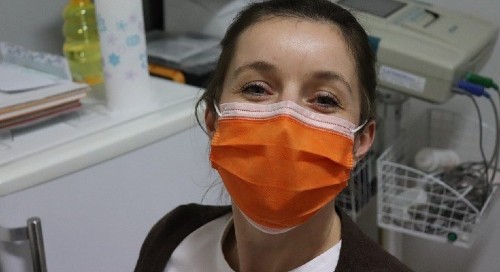The InVisionary
Voting holds tremendous power, and this single act gives your voice an opportunity to be heard across generations. While many of us have become disillusioned with the voting system and party politics, we must recognize the awesome privilege we have to choose who represents us both congressionally and locally.
Voters often erroneously place higher value on the presidential election over smaller, local elections, but these elections hold as much as—or even more—power to affect our lives and livelihoods than we think. In fact, many of the most important issues facing the human services industry are addressed locally.
DSP wages are appropriated through discussions between the Pennsylvania General Assembly and the Governor. They must work together to determine the amount of funding received by the Office of Developmental Programs (ODP) to distribute among disability services organizations for their operations and DSP wages.
“DSPs currently earn nearly 60 [percent] below a living wage…” Gary Blumenthal, InVision’s vice president of government relations and advocacy, and a former state legislator, said. “…Voters will need to remind both parties of the need to fully address the [DSP] work[force] crisis.”
Your vote directly determines who will make these decisions in the General Assembly. We must remind the candidates—and our elected officials—of the critical role DSPs play in the lives of the people they support and that they should be fairly compensated for they work they do.
“For too long, the state has depended on the good will of the DSP workforce to do their jobs despite the low pay,” Mr. Blumenthal said. “Our legislators work for us. We must demand that they treat our community with respect and dignity…” he added. “If they don’t represent the interests of the human services community, they will lose our votes. It’s that simple.”

All this being said, we still need to understand the national programs that affect our industry and the candidates who will or will not support them.
“Several issues are at risk in the 2020 election, including the future of Medicaid as a funding source for supports and services for people with intellectual disabilities and autism; as well as the overall issue of health care access for all Americans regardless of disability, age, or national origin,” Mr. Blumenthal said. People with disabilities rely on funding through Medicaid waivers to enroll in programs like the ones offered at InVision. Without this funding, many of the people we support would go without the services they need or the ability to remain in their communities.
It is our duty as voters to research each candidate and their position on programs like the Affordable Care Act (ACA) and their commitment to overall healthcare accessibility, which is vital to the well-being of the people we support.
This year has brought new opportunities and unexpected challenges to voting, and making a plan can help you prepare for the upcoming election:
You may also vote by mail-in ballot or absentee**, which are both safe and secure alternatives to in-person voting, especially during a global pandemic. Applications for a mail-in or absentee ballot must be received by your county election office by 5:00 p.m. on Tuesday, October 27. Don’t forget to place your mail-in or absentee ballot into the secrecy envelope provided! You can mail your ballot or drop it off at your county election office. Check the status of your ballot here.

Voters often erroneously place higher value on the presidential election over smaller, local elections, but these elections hold as much as—or even more—power to affect our lives and livelihoods than we think. In fact, many of the most important issues facing the human services industry are addressed locally.
DSP wages are on the ballot
Human services organizations, like InVision, rely on money from the state government to fund their operations, including DSP wages. InVision has called on our staff and supporters to write to or call their local representatives before to remind them about the challenges faced by direct support professionals (DSPs), and this is not coincidental.DSP wages are appropriated through discussions between the Pennsylvania General Assembly and the Governor. They must work together to determine the amount of funding received by the Office of Developmental Programs (ODP) to distribute among disability services organizations for their operations and DSP wages.
“DSPs currently earn nearly 60 [percent] below a living wage…” Gary Blumenthal, InVision’s vice president of government relations and advocacy, and a former state legislator, said. “…Voters will need to remind both parties of the need to fully address the [DSP] work[force] crisis.”
Your vote directly determines who will make these decisions in the General Assembly. We must remind the candidates—and our elected officials—of the critical role DSPs play in the lives of the people they support and that they should be fairly compensated for they work they do.
“For too long, the state has depended on the good will of the DSP workforce to do their jobs despite the low pay,” Mr. Blumenthal said. “Our legislators work for us. We must demand that they treat our community with respect and dignity…” he added. “If they don’t represent the interests of the human services community, they will lose our votes. It’s that simple.”

Don’t count out the importance of national candidates
All this being said, we still need to understand the national programs that affect our industry and the candidates who will or will not support them.“Several issues are at risk in the 2020 election, including the future of Medicaid as a funding source for supports and services for people with intellectual disabilities and autism; as well as the overall issue of health care access for all Americans regardless of disability, age, or national origin,” Mr. Blumenthal said. People with disabilities rely on funding through Medicaid waivers to enroll in programs like the ones offered at InVision. Without this funding, many of the people we support would go without the services they need or the ability to remain in their communities.
It is our duty as voters to research each candidate and their position on programs like the Affordable Care Act (ACA) and their commitment to overall healthcare accessibility, which is vital to the well-being of the people we support.
Make a plan to vote today
This year has brought new opportunities and unexpected challenges to voting, and making a plan can help you prepare for the upcoming election:Check if you're registered to vote.
This resource will also tell you where your polling place is if you plan to vote in-person. You may also contact your county’s local election office or call 1-877-VOTESPA (1-877-868-3772). If you aren’t registered, register as soon as possible. The deadline to register to vote in Pennsylvania is Monday, October 19*.*Not a resident of Pennsylvania? Follow this link and choose your state from the drop-down table.
Determine how you will vote.
If you choose to vote in-person, find your polling place. There is a potential for long wait times at polling locations, so come prepared, or plan to vote as early as you can. Polling places statewide are open from 7:00 a.m. until 8:00 p.m. on Tuesday, November 3.You may also vote by mail-in ballot or absentee**, which are both safe and secure alternatives to in-person voting, especially during a global pandemic. Applications for a mail-in or absentee ballot must be received by your county election office by 5:00 p.m. on Tuesday, October 27. Don’t forget to place your mail-in or absentee ballot into the secrecy envelope provided! You can mail your ballot or drop it off at your county election office. Check the status of your ballot here.

**If you choose to vote in-person instead after applying for and receiving a mail-in ballot, be sure to bring the ballot and envelope with you to your polling place.
Vote!
Voting is one of our greatest privileges as residents of the United States. Exercise your right to be heard and vote this November.Support people with disabilities’ right to vote
People with disabilities are afforded the same right to vote as anyone else. If you’re a DSP, talk to the person you support about voting. Stress the importance of their voice. Help them register, if needed, and make a plan to get them to the polls or complete a mail-in ballot.Mail ballot instructions image courtesy of votespa.com.





Comments (0)